04
Jul 2019Garbage Separation Mania in Shanghai
June 2019 in Shanghai was all about the 扫黑除恶 (“Sweep Black, Eliminate Evil“) campaign, but towards the end of the month, the new big topic became 垃圾分类 (literally: “garbage classification”).
So after years of (semi-successfully) trying to get everyone to stop littering and use the damn garbage cans, the decision has been made to go into full-on complex (Japanese-style?) garbage separation, even at the household level. This has resulted in a number of interesting phenomena.
The New System
Shanghaiist has details in English: Starting [in July], you’ll have to sort your own garbage or face fines in Shanghai.
Here’s the information distributed to my own home:

High-Tech Garbage Cans
Various “neighborhoods” in Shanghai started phasing in the new garbage separation policy a few months ago, but it still feels rushed. Some communities even had “high-tech garbage receptacles” installed in June. These things require a special card to even open. Then if you put the wrong garbage in the wrong can, you could get fined!

For the slightly paranoid, garbage tracking is very scary, considering how easy it would be to go through any individual’s garbage under this new system. (Or just fine people and profit.)
Garbage Separation Memes

Word is that public garbage cans on the street will soon be disappearing. Hence this “fashion statement.”
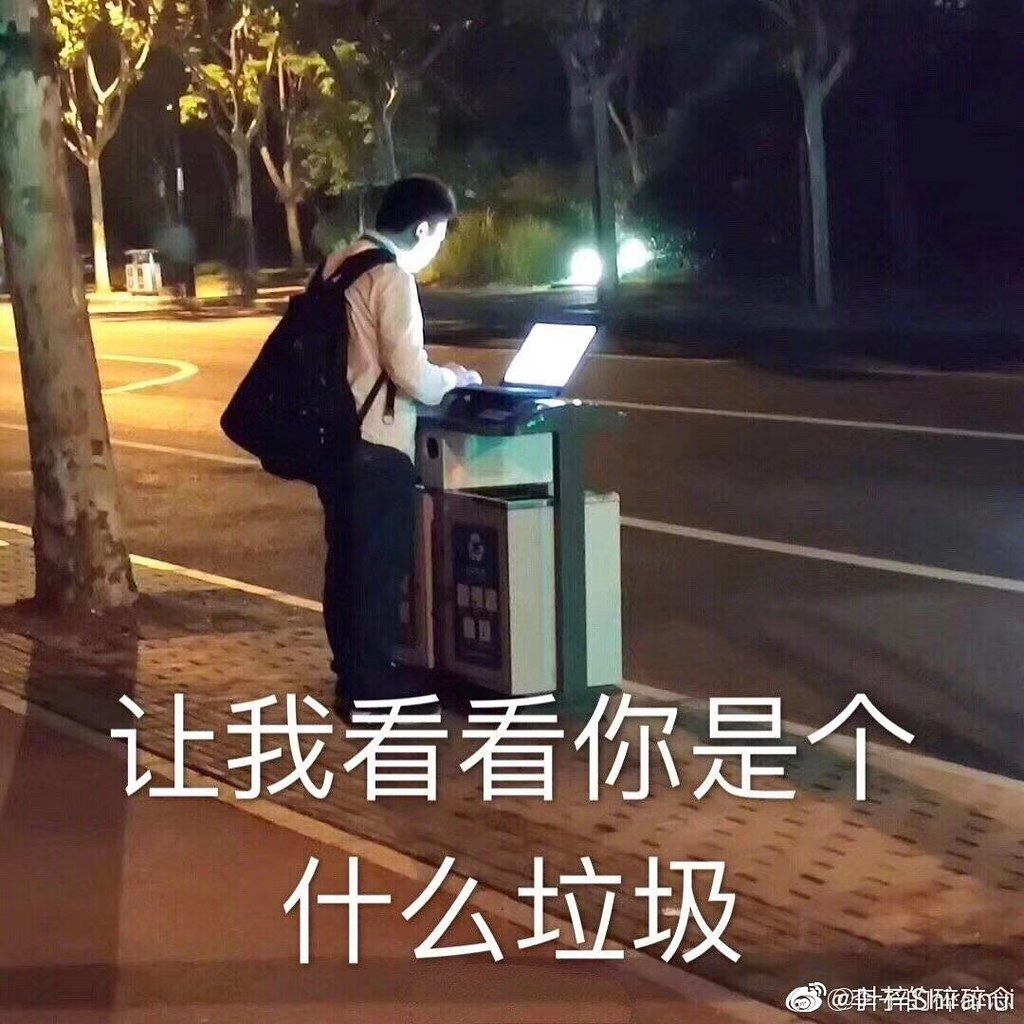
A classification system so complicated, you have to look stuff up online just to throw something away?? (There should be an app for that.)
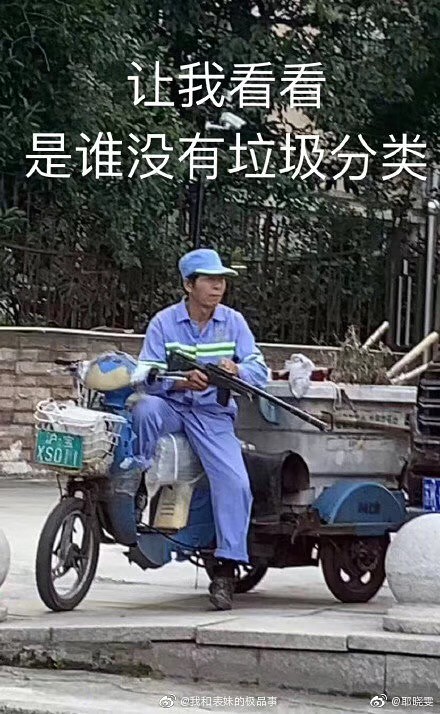
Don’t throw garbage in the wrong can… people are watching. (Yes, this is a joke.)
Final Thoughts
Sure, it’s a good thing to be more responsible about dealing with garbage as a society, especially in a society as populous as this one. It does feel an awful lot like people are being forced to run before the can walk, though. If this doesn’t work, the result is going to be widespread littering all over the city! But still, this initiative is going to happen because it’s being pushed through by the will of the government. It’ll be interesting to see how this turns out!
26
Jun 2019Writing “biang”
My daughter has just finished first grade in a Chinese elementary school. I’ve been absolutely blown away by how many characters she has learned in her first year (that’s a topic of an upcoming post).
Just the other day, we were having a conversation (mostly in English) about what characters we thought were “hard.” It was interesting getting her perspective, because it was totally different from mine. We didn’t agree at all on which ones were “hard.”
That’s when I brought up the (non-standard) Chinese character “biáng,” a ridiculously complex character used only to write “biángbiáng 面” (a kind of noodle). Anyway, she loved it, and after writing it a few times, can now write it from memory, and it actually looks pretty good.
Please excuse the “proud dad” nature of this post… I’m actually more blown away than straight-up proud. No one even encouraged her to learn to write this character. But here’s her writing the character from memory (bad video quality… sorry):
And here’s the finished product, after she added a bit of extra text to the top and bottom:

42个笔画
[biáng]好难啊!
Note: computers cannot display this Chinese character. It’s often written in pinyin, and even when it appears on menus in China, it’s either handwritten or some weird mismatched pasted-on character.
And yes, my 7-year-old’s Chinese handwriting is already better than mine. It only took one year.
Lesson learned: a lot can be learned in one year. Adults may not typically be able to learn like children, but it’s still inspiring to see what’s possible!
P.S. And no, the syllable “biang” is not even on most pinyin charts. Obscure character, obscure syllable!
19
Jun 2019Sweep Black, Eliminate Evil
If you live in China and can read some of the Chinese around you, you’ve probably noticed this phrase of late:
扫黑除恶
Literally, “sweep black, eliminate evil.” It refers to the current ongoing crackdown on “crime” and “vice.”
It is super pervasive, though. Big red banners like this are on almost every single street corner in Shanghai now (this image not from Shanghai):

And then there are signs like this everywhere as well:

Given how the city is heavily blanketed in this propaganda right now, you might be forgiven for thinking that the city was absolutely infested with crime, with drug-dealers and prostitutes on every corner. But no, that’s not the case. To the casual observer, there’s no clear reason for the severe crackdown.
If you talk to the Shanghai foreigners that hang out in bars a lot, you’ll hear that there have been many raids this month, including forced drug tests and deportations. So drug-related arrests are definitely happening, but again, that is not at all related to the average resident of Shanghai.
If you ask Chinese people about it, they typically mention that it’s a move to take out organized crime (黑社会). You also see stuff like this:
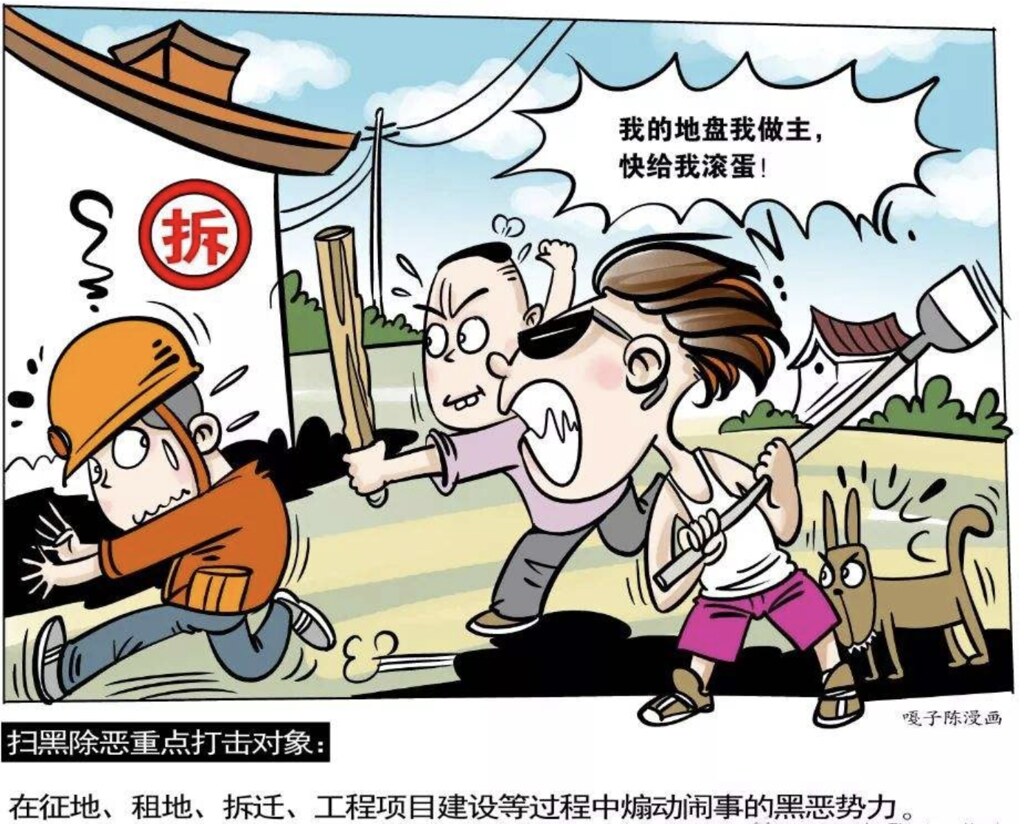

I don’t doubt that’s true, but the bizarre part about this campaign is that the “evil” being combatted seems to have absolutely nothing to do with most people. I can’t see it or feel it (I certainly have never seen mobsters shaking down fruit vendors in Shanghai). And I think that this is true for most Chinese citizens. So really, all the propaganda is just to let you know: “we are totally kicking crime’s butt right now.”
OK… it’s just one of those weird things about living in China.
12
Jun 2019The Four Strands of a Balanced Language Course
I’ve been going through some literature in the field of second language acquisition, and this includes Paul Nation’s 2001 work, Learning Vocabulary in Another Language. In case you’re not familiar with him, Paul Nation is regarded as one of the world’s foremost academics in the field of vocabulary acquisition, and his books are well worth reading.
Anyway, I wanted to share what Paul Nation describes as “the four strands” of a “balanced language course.” It’s worth noting that this book was published in 2001, and Paul Nation is not introducing radical new ideas here; he’s simply gently reminding the learner about some facts that researchers in the field of second language acquisition have known for some time. And yet, what follows is probably not going to sound familiar to most of you that have ever studied a foreign language in school. It’s truly jarring just how strong the grip of traditional language teaching in our educational system still is.
The “Four Strands” given by Paul Nation in the introduction of his book are:
Comprehensible Meaning-Focused Input
Firstly there is learning from comprehensible meaning-focused input [see the input hypothesis]. This means that learners should have the opportunity to learn new language items through listening and reading activities where the main focus in on the information in what they are listening to or reading.
Language is all about conveying meaning! (This fact is surprisingly easy to forget.)
Form-Focused Instruction
The second strand is one that has been subject to a lot of debate. This is language-focused learning, sometimes called form-focused instruction (Ellis, 1990). There is growing evidence (Long, 1988; Ellis 1990) that language learning benefits if there is an appropriate amount of usefully-focused deliberate teaching and learning of language items.
This type of learning is what we think of as the traditional “teacher teaching” approach. Obviously, there are also “good ways” and “bad ways” to go about the explicit instruction, but that’s another topic…
Meaning-Focused Output
The third strand is meaning-focused output. Learners should have the chance to develop their knowledge of the language through speaking and writing activities where their main attention is focused on the information they are trying to convey.
Nation also makes the point that focusing on output can really bring focus and meaning to listening and reading activities, as an observant learner can “pick up” how certain information is expressed in the target language.
Fluency Development
The fourth strand in a balanced course is fluency development. In activities which put this strand into action learners do not work with new language; instead, they become more fluent in using items they already know.
“Using items they already know!” I feel like this is blasphemy for some. And yet, yeah, you gotta practice using what you have merely studied. There is an implication here that should not go unnoticed: if you don’t ever focus on “fluency development,” then you don’t develop true fluency.
The Distribution
OK, this is the real kicker. If you’re a teacher, you may be thinking, “yeah, that all sounds fine.” But then how much time would you spend in your curriculum on each of the four strands? Nation mercifully gives us very clear numbers on the ideal distribution:
In a language course, the four strands should get roughly the same amount of time. This means that no more than 25% of the learning time in and out of class should be given to the direct study of language items; no less than 25% of the class time should be given to fluency development. If these strands are not equally represented, then the design of the course needs to be looked at again.
So, to be absolutely clear, this is what Paul Nation is advocating in his book:
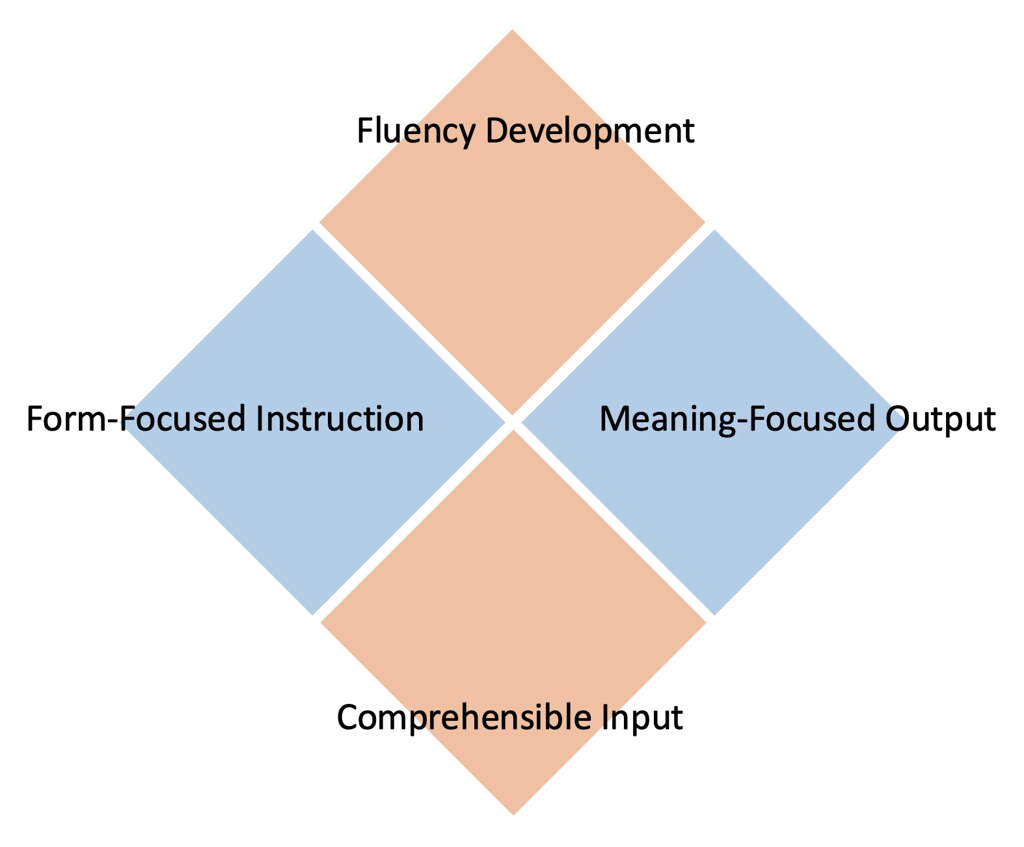
…and this is a (somewhat optimistic) representation of what he knows to be the case in most language courses:

The status quo is not good. It doesn’t lead to true fluency.
06
Jun 2019New Star Wars Comics in Chinese
At the book store the other day, I noticed this series of graphic novels that covers the entire Star Wars saga (Original Trilogy, Prequel Trilogy, and Sequel Trilogy: all 9 movies):

I’m not sure these comic exist in English, but I imagine they do? (Anyone know?)
The 9 movies’ names, in Chinese are:
- Prequel Trilogy
- 星球大战前传一:幽灵的威胁
Star Wars: Episode I – The Phantom Menace (1999)
- 星球大战前传二:克隆人的进攻
Star Wars: Episode II – Attack of the Clones (2002)
- 星球大战前传三:西斯的复仇
Star Wars: Episode III – Revenge of the Sith (2005)
- 星球大战前传一:幽灵的威胁
- Original Trilogy
- 星球大战:新希望
Star Wars: A New Hope (1977)
- 星球大战2:帝国反击战
Star Wars: Episode V – The Empire Strikes Back (1980)
- 星球大战3:绝地归来
Star Wars: Episode VI – Return of the Jedi (1983)
- 星球大战:新希望
- Sequel Trilogy
- 星球大战7:原力觉醒
Star Wars: The Force Awakens (2015)
- 星球大战8:最后的绝地武士
Star Wars: The Last Jedi (2017)
- 星球大战9:天行者崛起
Star Wars: The Rise of Skywalker (2019)
- 星球大战7:原力觉醒
There are some good Star Wars-related key words in there (Jedi, Sith, Skywalker, etc.)… Only problem is that most Chinese people don’t care for Star Wars, so it’s not exactly “practical vocabulary” we’re talking about here! If this is a “Chinese market only” series, then I imagine it’s an effort by Disney at “cultural education” leading up to the final episode of the Skywalker Saga.
31
May 2019Graded Readers at 150 Characters
This is just a quick note that Mandarin Companion has released its “Breakthrough Level,” a series of graded readers requiring only 150 simple characters to read.

I’ve been developing this for over a year, and it was quite a challenge. In fact, I originally designed Mandarin Companion’s Level 1 to be 300 characters because I felt at the time that that many characters really were needed to tell a full, decent story (10,000 characters long).
So has my opinion changed? Not exactly… Mandarin Companion Level 1 and 2 stories are all adaptations of existing classic works. Although we do take some liberties with the plots as we adapt them to Chinese stories, the overall plots remain intact. In order to adapt an existing story, you need a “story toolkit” of a certain size to pull it off.
Breakthrough Level (150 characters), on the other hand, doesn’t work that way. The stories are not adaptations. They’re original stories (by Jared and me), because they have to be. The plot of each story revolves around the words that we can actually work with at this level, and at 150 characters, we have just enough to pull it off. It’s been an interesting ride!
22
May 2019“X” and “SH” are not the same, Pam!
I enjoyed this:
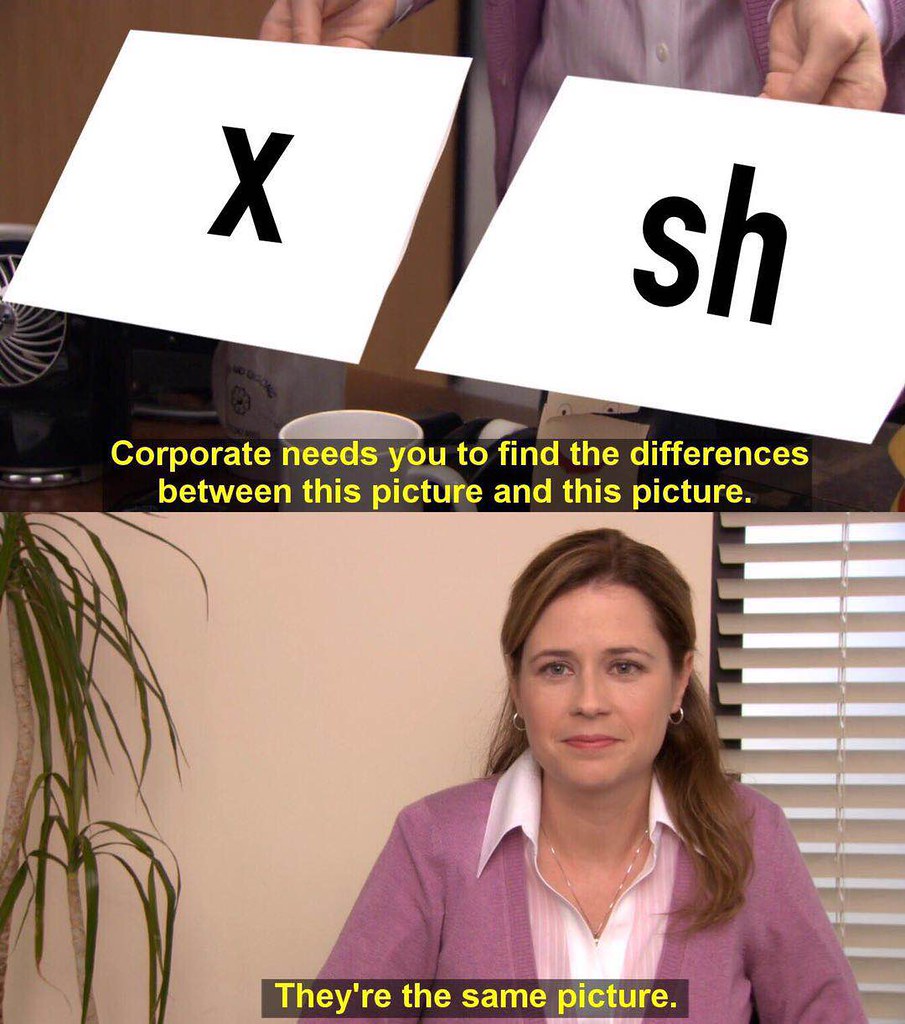
“Meme artist” unknown, but I found the meme on the Chinese Language subreddit.
Obligatory educator nag: the “x” and “sh” sounds in pinyin are not the same sound, even if they may sound that way to you at first. Here are a few places you can go if you’re experiencing this confusion:
15
May 2019Are Chinese Hospitals Going Smart?
The average person in China doesn’t go to a doctor’s office when they get hurt or sick; they go straight to a hospital. Then they have a pretty horrible (often all-day) ordeal ahead of them, involving paying to get a number, waiting to be seen, getting briefly looked at to determine next steps, then waiting in line to pay for tests or other services, then waiting on the results, then taking them back to the original doctor for a final diagnosis, etc. It really is a ton of time waiting in line to be seen by a person with (understandably) very little patience, only to be curtly passed off to the next term of waiting.
So when recently I visited Huashan Hospital in Shanghai (one of the better public ones), I was surprised to see these kiosks:

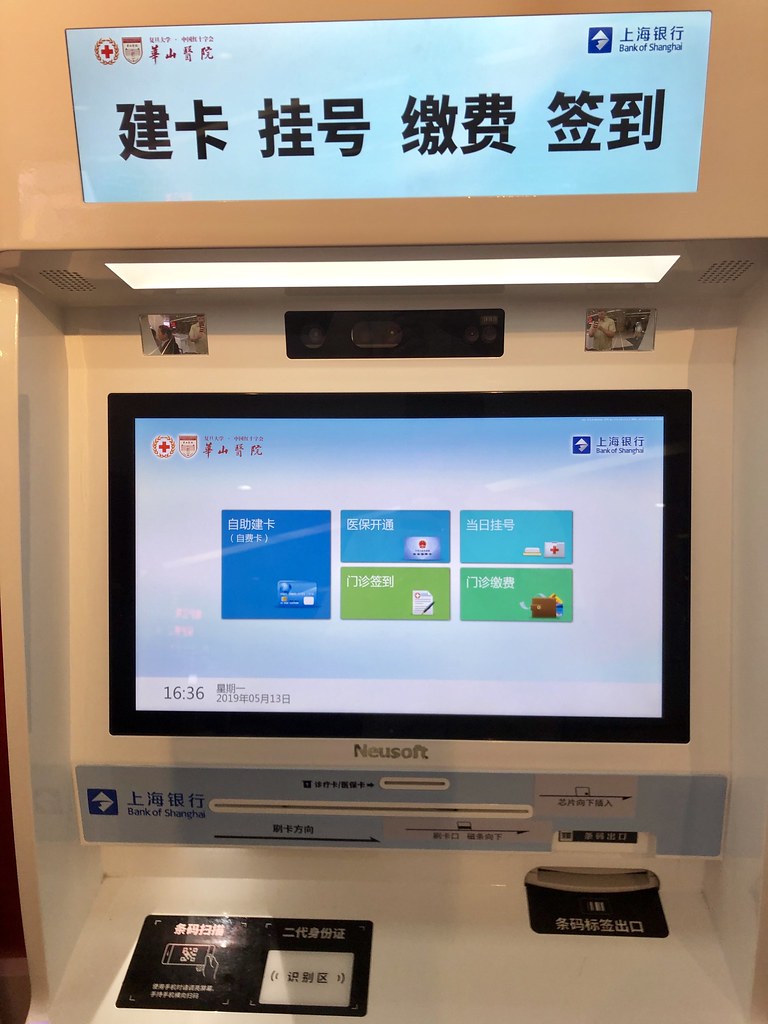
The big title on the wall is 智慧e疗. The 智慧 refers to “smart,” and the e疗 is a pun on 医疗, which means “medical treatment.” (Not even healthcare is above a good old “e” pun!)
The closer view displays the following words:
- 建卡 (jiàn kǎ) to create a card (and associated account)
- 挂号 (guàhào) to register (at a hospital)
- 缴费 (jiǎofèi) to pay fees
- 签到 (qiāndào) to sign in (for an appointment)
I didn’t use this kiosk, and it seems not many people did. Hopefully progress is just around the corner!
08
May 2019Don’t Waste Time Studying What You Can Simply Acquire
One of my clients recently shared this article and asked my thoughts: Learning Chinese: from gruesome, to good, to great.
I’d sum up the three main pieces of advice for getting Chinese to “great” as follows:
- The first is changing where you talk from, physically. (Don’t sound all high-pitched.)
- The second is changing how you breathe. (Focus on tones.)
- The third is changing the rhythm. (Mimic native speakers.)
Although the titles sound like incredibly difficult tasks to accomplish, the practical advice which follows (and I’ve summed up in parentheses above) is not at all bad.
Learn Implicitly When You Can
The daunting tasks above touch on one of the tricky things about the field of second language acquisition: separating what should be explicitly taught from what should be learned implicitly through exposure and practice. For the vast majority of learners, all three of the main points (voice, breathing, rhythm) should be acquired implicitly over time, and don’t need much active focus. (Almost all learners benefit much more from focusing on the main pronunciation issues they’re probably already aware of, and getting a good handle on those.)

Everyone is different, though, so it’s possible that some people in certain circumstances (such as actors, professional singers, etc.) will benefit from active focus on breathing techniques, for example.
“Voice Quality”
I can give one example of my own personal experience with the one about “changing where you talk from, physically.” When I was working on my masters at East China Normal University (华东师范大学), one of my professors, Mao Shizhen, was an expert in phonology, as well as a voice coach for news broadcasters and the like. This was back in 2006 or 2007, and he once told me that my Chinese was quite good, but that my voice quality (I think he used the word “音色”) didn’t feel like a native Chinese person’s, and that to sound truly native, I should work on that. I later learned that I had a host of other issues I still needed to focus on to sound more native (most of which I’ve written about on Sinosplice at one point or another), so I didn’t worry about the “voice quality” issue or focus on it at all. Over time, though, my “voice quality” started sounding more and more natural due to increased fluency and practice. My Chinese may not be perfect or sound exactly like a native speaker’s, but I regularly fool people into thinking I’m a native speaker on the phone, and that’s good enough for me.
Explicit Tone Learning
An even better example to highlight the “explicit/implicit” difference is the tones of Mandarin Chinese. Most of us start out pathetically oblivious, and we really appreciate explicit instruction explaining what tones are, why they’re important, how to make them, how to practice them, etc. We want to know, and we feel that the explanation helps us, even if deep down we know that you could master tones simply by mimicking native speakers, just like a baby does. Unlike babies, adult learners can actually benefit a lot from explicit instruction. (They still need plenty of practice, though.)
Here’s the thing with tones, though: you need to learn the 4 tones (plus a neutral tone) well. You need to learn the tone change rules well. Everyone benefits greatly from tone pair practice, so you should do that as well (and that one will take a bit longer to really master).
But after you’ve hit the big three, you can stop digging deeper into the tiny intricacies of tones. Are there other, more subtle tone changes going on? Yes. Are all fourth tones created exactly equal? Actually, no. But these are questions that you can delegate to your (under-appreciated, underestimated) unconscious brain.
Conclusion
If you continue to strive to sound like native speakers, imitating their speech patterns as well as you can, you will get closer and closer to native as time goes on, and that includes implicitly learning aspects of the language that you didn’t even know you were learning. Have you ever asked a native speaker a question about their language, only to realize that you know more than they do about this particular aspect of their language (grammar, etymology, tone changes, etc.)? That’s because they’ve implicitly mastered the language and don’t need to be conscious of those concepts to use it fluently.
In fact, some of my proudest language learning moments have been discovering that I had mastered something without even studying it. This has included usage of certain words or grammar points, as well as tiny nitpicky details of pronunciation. Everything is fair game. Because you probably started out learning everything explicitly, it becomes a habit, and you may think that you’ll always have to do it that way. I’m happy to say that this is not the case. The better your Chinese becomes, the more you can (and should) learn implicitly, through exposure and regular practice.
So remember: you need practice, you need input. Focus on comprehension and imitating native speakers. You’ll learn a whole lot more implicitly than you think.
30
Apr 2019Learning a Language Is Like Learning Jazz
I’m not going to plug every single podcast “You Can Learn Chinese Podcast” we do, but then not every podcast we do has Dr. David Moser! For this one, I took over the interviewing responsibilities and had a good chat with Dr. Moser in our Shanghai studio.
We touch on a few topics I’ve covered on Sinosplice in the past:
(The jazz analogy part is new.)
And if you haven’t read this article by Dr. Moser, you should!
23
Apr 2019Come on, drink it! (says the hippo)
I spotted this new bubble milk tea shop recently:
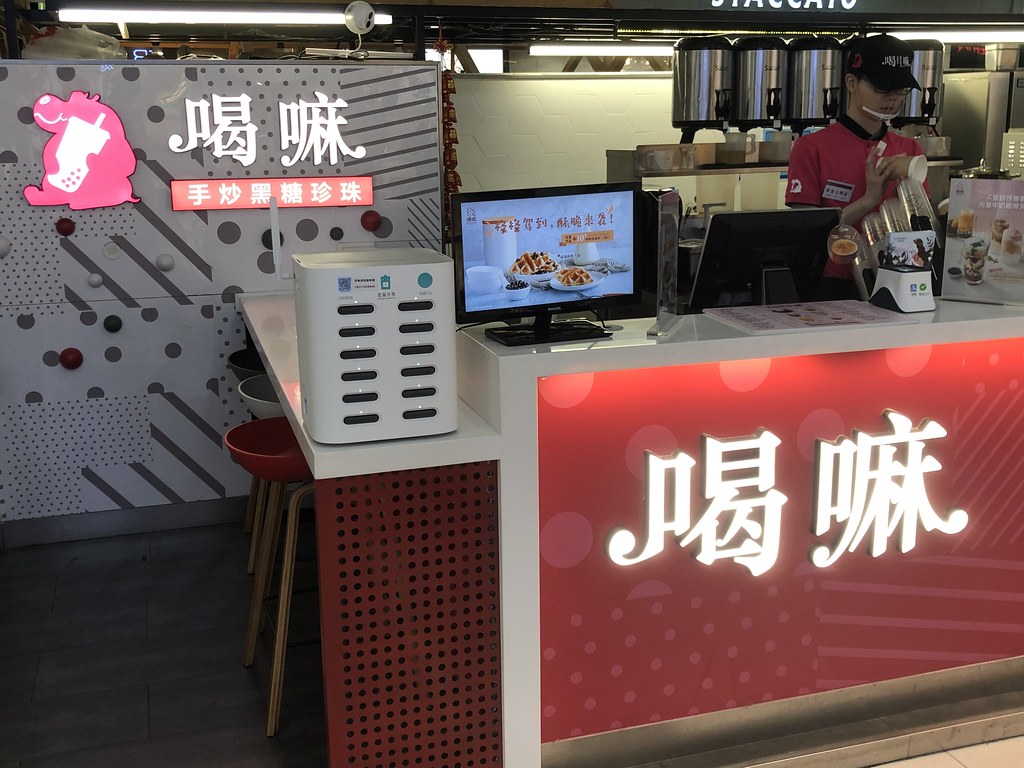
The name is 喝嘛, which is just the verb 喝 meaning “to drink,” combined with the particle 嘛, used to “express the self-evident.” This is a command, though. How does a command “express the self-evident?”
To a native speaker, the feeling of the two usages is connected, but here the word 嘛 adds the feeling of a somewhat whiny, “come on, do it….” In fact, that phrase “come on” (used when persuading) could be translated 来嘛.
So yeah, this product name is actually saying, “come on, drink our product. You know you want to! Come on…”
What’s the deal with the hippo? Well, “hippo” in Chinese is 河马 (literally, “river horse,” which is also the meaning of the Greek roots of the English word as well). So we’ve got a pun here.
10
Apr 2019Neiwai’s Clever Logo
There’s a Chinese women’s clothing brand called NEIWAI (内外), literally, “inside-outside,” and it has one of the cleverest examples of characterplay that I’ve seen in a while [image source]:

It might take a few seconds to get, but what you’re seeing is the character 内 on the left, slightly modified so that the character 外 on the right overlaps it on its left side.
Here’s an unstylized version of the overlap that’s going on in the logo:

So, at the risk of pointing out the obvious, you have “outside” both inside and outside “inside.” Meanwhile, “inside” is also both inside and outside “outside.”
04
Apr 2019Meituan Morning Meeting
This picture was taken from my office building (18th floor):
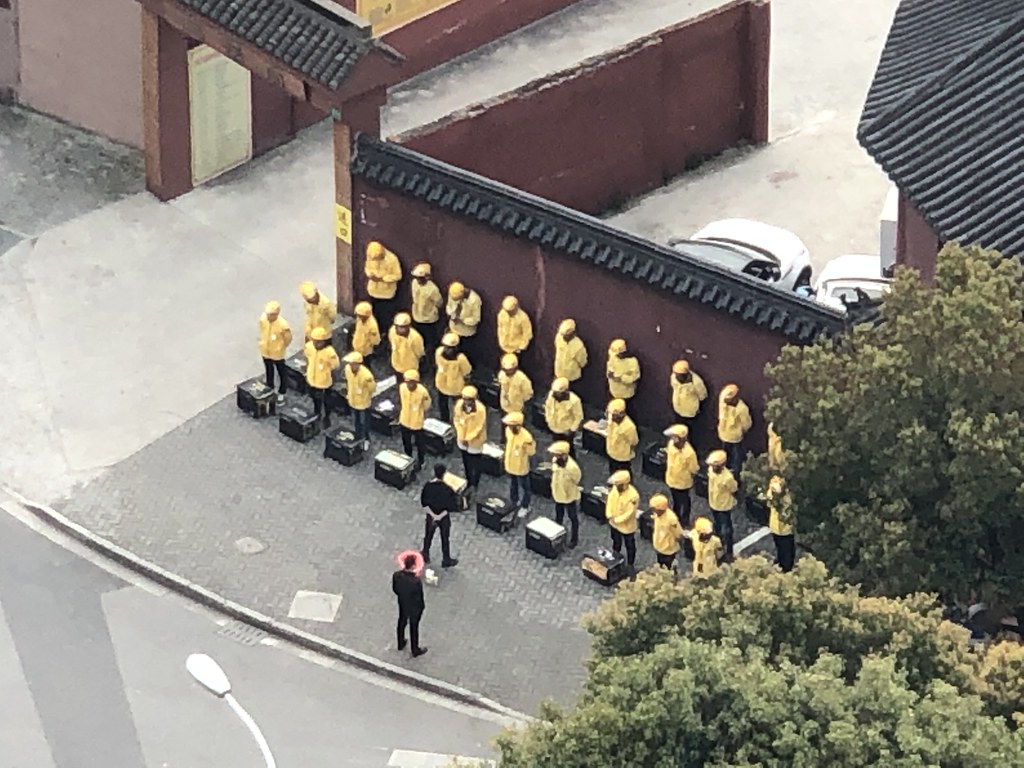
It’s a crew of delivery guys which have become an extremely common site in big Chinese cities. The yellow uniforms belong to 美团 (Meituan), while the chief competitor, 饿了么 (Ele.me) decks its delivery guys out in light blue.
I’m no expert, but I would assume they do these daily morning meetings as the only time these “co-workers” are even together in the same place. The rest of the day they’re on and off their scooters all over the city, speeding from restaurant, to home, to restaurant, to home….
02
Apr 2019This box is very afraid
I was struck by the use of the word 怕 on this package:
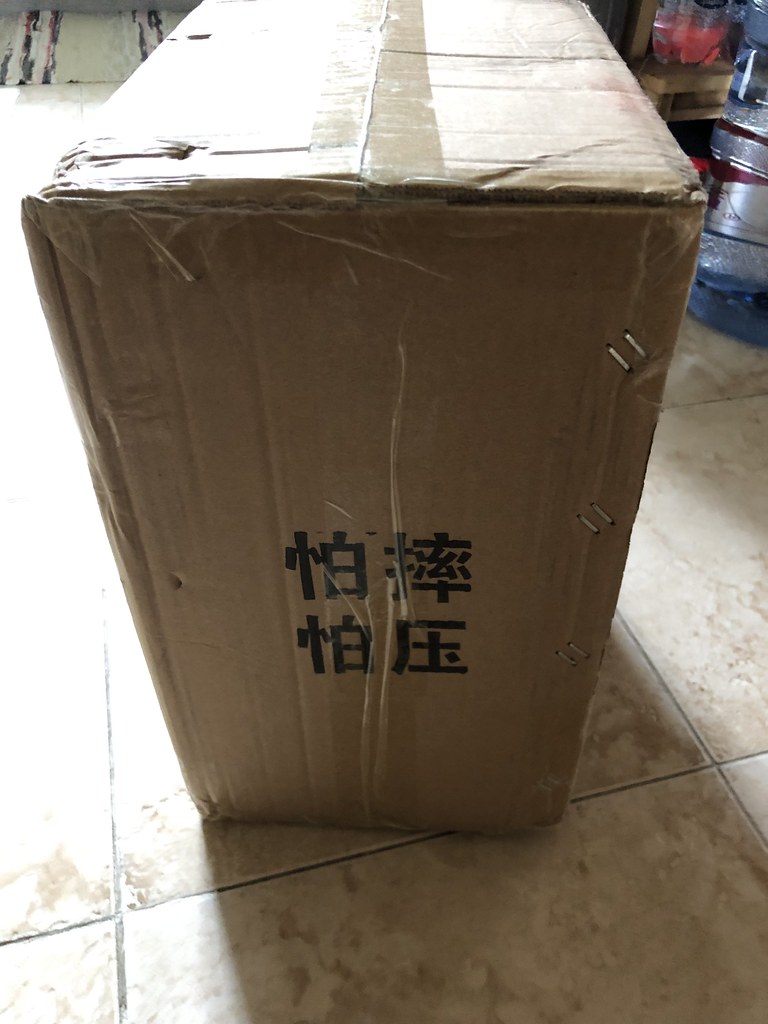
It reads:
怕摔
怕压
Literally, “afraid of being dropped” and “afraid of being crushed.” I’m more used to seeing 易碎 on boxes: literally “easily broken” or “fragile.” This struck me as interesting because neither the box nor its contents actually fears anything. It doesn’t feel like an anthropomorphic usage, so it’s got to be an abstraction of the human “fear” emotion.
When I thought about it some more and talked about it with some AllSet Learning teachers, I realized it’s not just a matter of the two kinds of fear “human fear” and “abstracted fear”; there’s actually a whole range of usage with this 怕:
- 怕冷 (pà lěng) to be sensitive to the cold (lit. “to be afraid of cold”)
- 怕热 (pà rè) to be sensitive to heat (lit. “to be afraid of heat”)
- 怕辣 (pà là) to be sensitive to spiciness (lit. “to fear spicy”)
- 怕生 (pà shēng) to be afraid of strangers (lit. “fear the unfamiliar”)
- 怕黑 (pà hēi) to be afraid of the dark
- 怕死 (pà sǐ) to be afraid of death
- 怕高 (pà gāo) to be afraid of heights
- 怕人 (pà rén) to be shy around people (usu. describing a child), to be afraid of people (usu. describing an animal)
- 怕水 (pà shuǐ) to be afraid of water (usu. because one cannot swim)
Are they just degrees of the same emotion? Or are they totally different usages? It can be difficult to separate shades of meaning, especially for native speakers. This is what the field of semantics deals with.
To me, learning how other languages construct words and phrases in both familiar and utterly unfamiliar ways is one of the major joys of learning a language.
27
Mar 2019Chloe Bennett in the Shanghai Metro
When I first saw these ads, I felt that this woman looked familiar, but I couldn’t place her, and the Chinese name 汪可盈 didn’t mean anything to me.

I also felt like she didn’t look 100% ethnically Chinese, despite the Chinese name (and lack of English name).

Turns out this is Chloe Bennett, the star of Agents of S.H.I.E.L.D.

It’s kind of interesting how her English name in the U.S. shows no trace of Chinese heritage, but when she appears on ads in China, her English name is not used at all.

Turns out that “Wang” is her surname by birth (her father is Chinese), and she actually pursued a singing career in mainland China as a teenager, using the name 汪可盈.
According to Wikipedia:
While pursuing an acting career in Hollywood, she changed her name to “Chloe Bennet,” after having trouble booking gigs with her last name. According to Bennet, using her father’s first name, rather than his last name avoids difficulties being cast as an ethnic Asian American while respecting her father.
Furthermore, she has explained Hollywood’s racism this way:
“Oh, the first audition I went on after I changed my name [from Wang to Bennet], I got booked. So that’s a pretty clear little snippet of how Hollywood works.”
The ad, using super simple Chinese, reads:
找工作 [(when) looking for a job]
我要跟 [I want to]
老板谈 [talk with the boss]
13
Mar 2019Geese in the Mall
This ad is hanging in Shanghai’s “Cloud 9” (龙之梦) shopping mall:
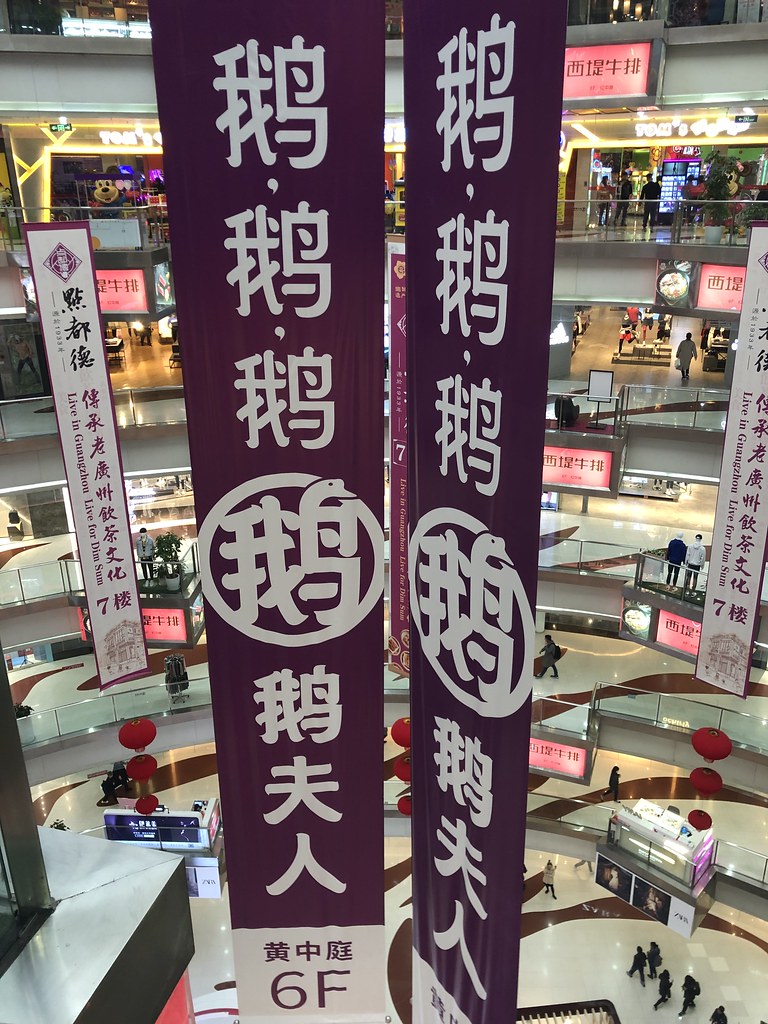
First of all the repeating character is 鹅, which means “goose.” In the circular logo, you can see a little characterplay going on with the goose head.
Above that, you have “鹅,鹅,鹅” which, of course, reads “goose, goose, goose.” This is a famous first line of a classical Chinese poem. It’s famous because it’s so simple, so a lot of kids memorize it as one of their first (if not the first) classical poems committed to memory.
Here’s the poem in its entirety:
鹅 鹅 鹅,
曲 项 向 天 歌。
白 毛 浮 绿 水,
红 掌 拨 清 波。
And in English (source):
Goose, goose, goose,
You bend your neck towards the sky and sing.
Your white feathers float on the emerald water,
Your red feet push the clear waves.
The banner is an ad for a restaurant, 鹅夫人, or “Madame Goose.”
06
Mar 2019Pleco Tip: Word Containing (Reversed)
Pleco is a really powerful dictionary app, and it has a lot of features many people don’t even know about, such as the Clipboard Reader. This one is simply a part of dictionary entries that many people have never noticed.
Check out this entry, paying attention to the top and the bottom:
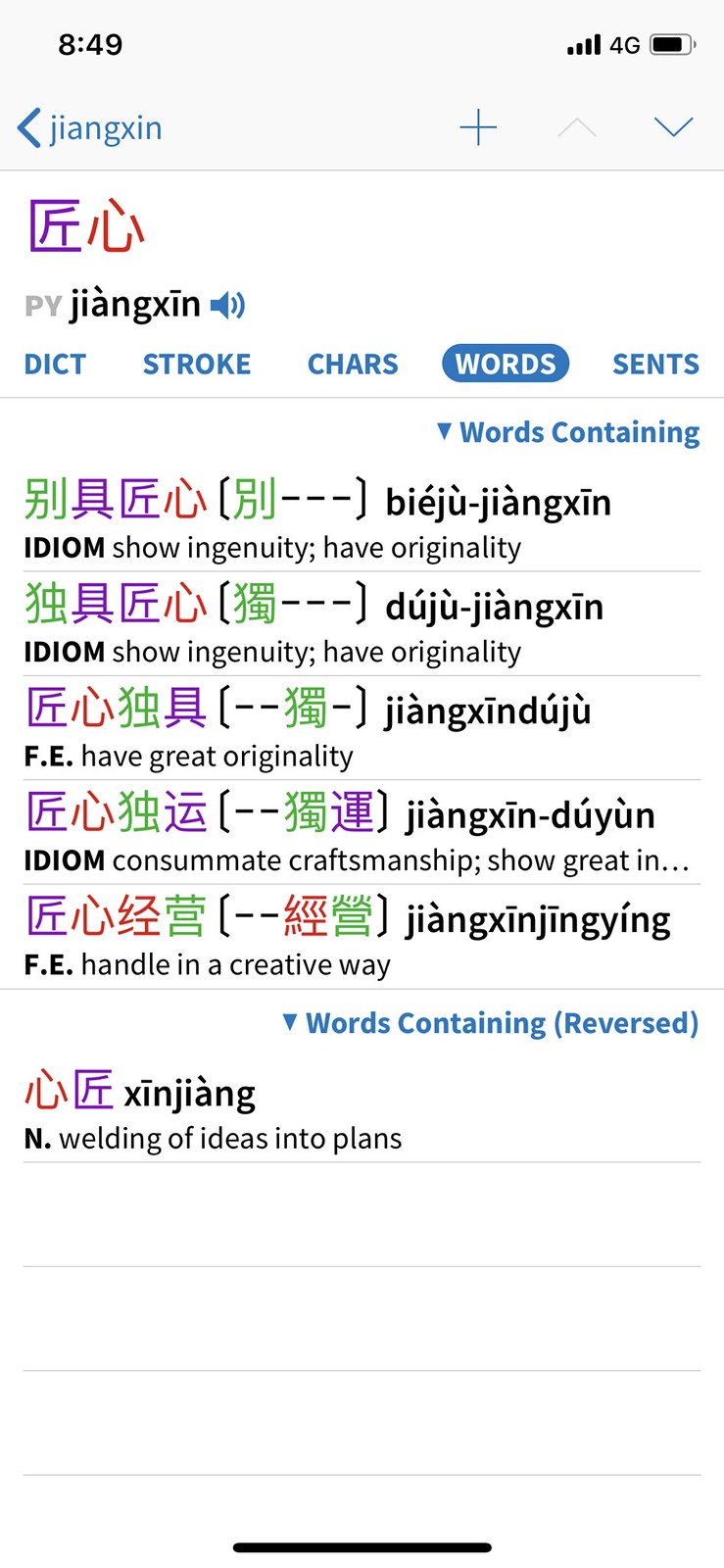
Note the bottom line: it’s an example of the word that was looked up, but in reverse.
More Examples
I’m not going to give too many (and I’ll explain why below), but here are some relatively common examples of what I’m talking about which intermediate learners may encounter:
- 适合 / 合适
- 互相 / 相互
- 犯罪 / 罪犯
- 代替 / 替代
(Mouse over the above words for pinyin.)
Why “Words Containing (Reverse)” Is Useful
This feature is really useful because we learners so often find ourselves misremembering new words by reversing the two characters in the new words that we learn (and most words in Mandarin are two characters). Many learners I’ve spoken with think that it’s a unique problem specific to them, but no, I can assure you: this happens to most, if not all, of us. It doesn’t mean you’re dyslexic or weird; it just means you’re normal.
The reason it’s important to identify words that are also another word in reverse is that it can prevent you from going crazy. This is because most often the reverse of a word you’ve learned is just plain wrong, but not always. Yes, I can remember several times when I’ve learned a word–let’s call it “AB”–and then I hear the word “BA” used in the same way. So then I think, “Oh, I misremembered it. It’s not ‘AB.’ It’s actually ‘BA’.” And then I once again hear “AB” used in the same way as “BA,” but there has enough time in between the two that my memory of what happened before is fuzzy. So then I think, “Oh, I misremembered it. It’s actually ‘AB’.” Rinse and repeat. That cycle of confusion can go on for a very long time.
How to Use It Correctly
So to protect your own sanity, it’s good to identify the words that are another word when you reverse the characters. (Sometimes they mean the same thing, and sometimes they totally don’t.)
Note that I’m not saying you should study a list of these words. That would just create more confusion, and a lot of the words won’t even be useful to you. It’s just good to learn that there is a “reverse word” for the words you already know or have just learned (and you can use Pleco to check that). If the “reverse word” is useful or common, that you might want to learn it. It’s it’s not, then it’s enough to just be vaguely aware that it exists (and you can always check Pleco again if your memory gets fuzzy).
The only problem with the Pleco feature is that if you look up a word in the dictionary, the “Dict” tabbed section is selected by default. You need to choose the “Words” section and also scroll to the bottom to find the “Words Containing (Reversed)” list.

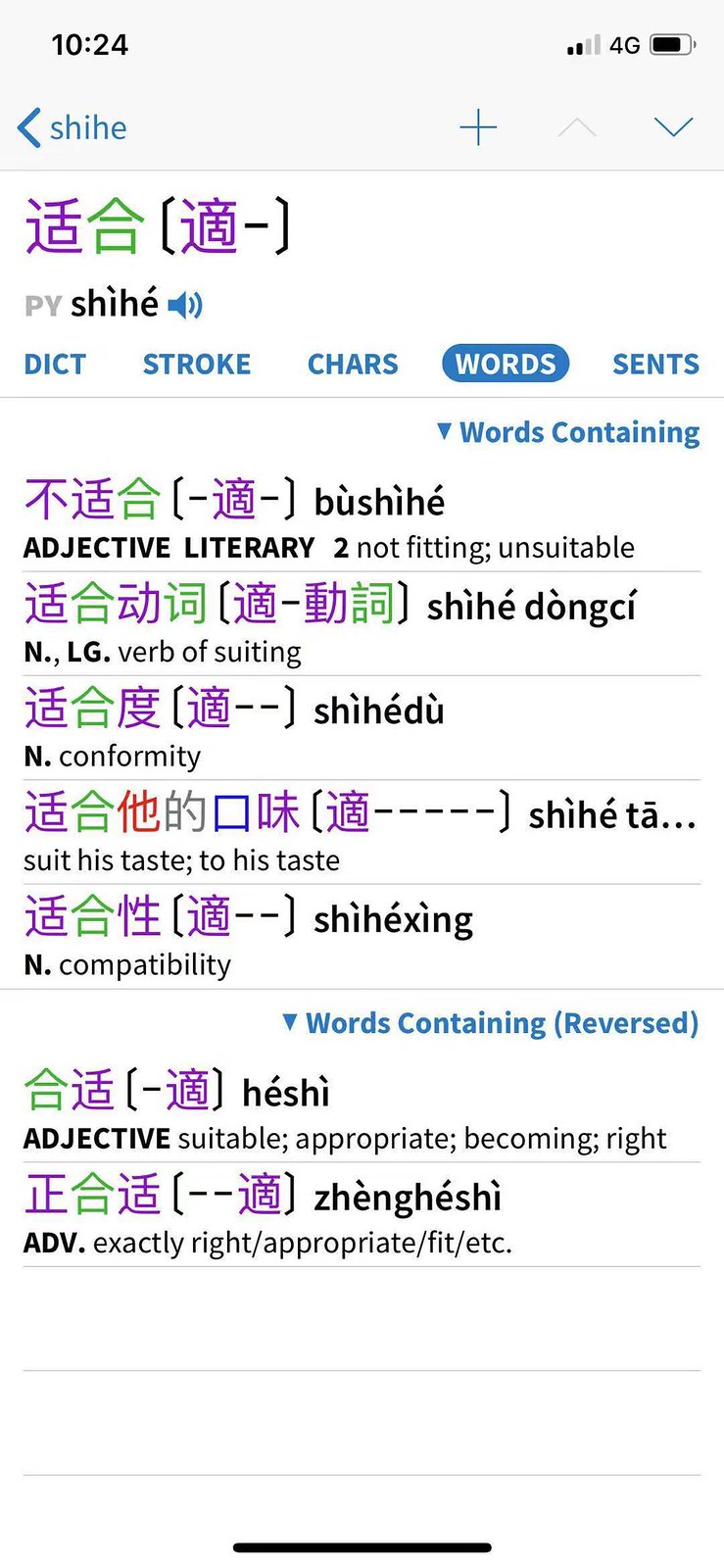
26
Feb 2019Language Power Struggles, 9 Years Later
Probably my most popular blog post ever has been the Language Power Struggles one from way back in 2010. It’s hard to believe it’s been 9 years since I wrote that, and when I recently discussed the issue with Jared in our podcast, I realized that my attitudes have changed a bit over the years.
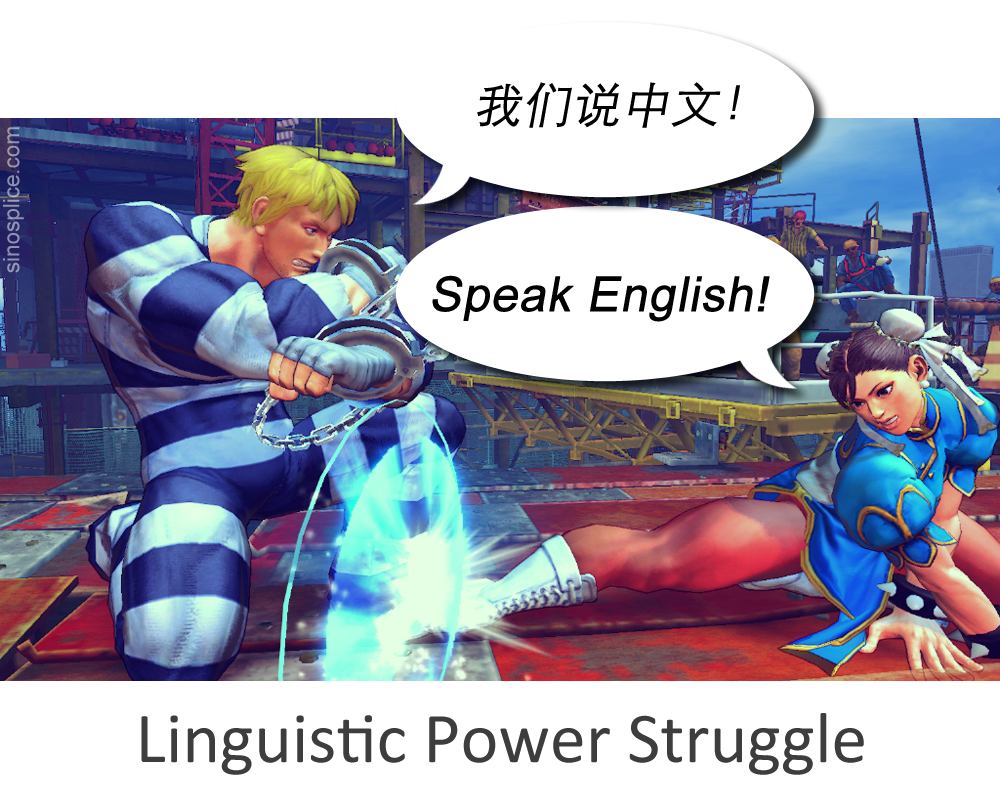
The advice that I gave in that article still stands: that in a battle of wills where communication is not the goal of interaction, no one really wins. And if you’re interacting with Chinese people both to improve your Chinese and to have meaningful communication with other human beings, it’s best not to participate in these silly “power struggles.”
And yet I can clearly remember routinely participating in these meaningless battles of will, whether at a restaurant talking to the server, or in a store, or getting a haircut… And now I recognize that back in the beginning a big part of what drove the stubbornness to engage in the struggles was insecurity. As if by refusing to communicate with me in Chinese, the other person was insulting the Chinese level I had worked so hard to achieve. I imagine the other person may often have felt the same way. So then you’re left with two egos duking it out over language supremacy, but also not really even caring about the other person’s level.
So nowadays I’m a lot more laid back and compassionate about people insisting on using English with me. Not everything has to be about principles of efficiency or showing proper “respect.” I know, it sure took me long enough to recognize this (and it’s a bit embarrassing), but I think that at the root of it was simply a dearth of quality communication in Chinese. After starting my own company in 2010 and working with all Chinese staff all day every day in Chinese, I no longer felt a need to use Chinese in every other interaction, because I had my fill.
So, to those of you who, like me, like to ponder these sociolinguistic issues, I ask you: do you participate in language power struggles? Do they annoy you? Is your emotional reaction to them (or lack thereof) a factor of your own personality, or do you think it’s related to “having your fill” practicing Chinese? How big of a factor is linguistic insecurity?
P.S. I like the “Han Solo-Chewbacca communication” concept Jared brought up in the podcast!
22
Feb 2019Characterplay with Buttons
Spotted in Shanghai:
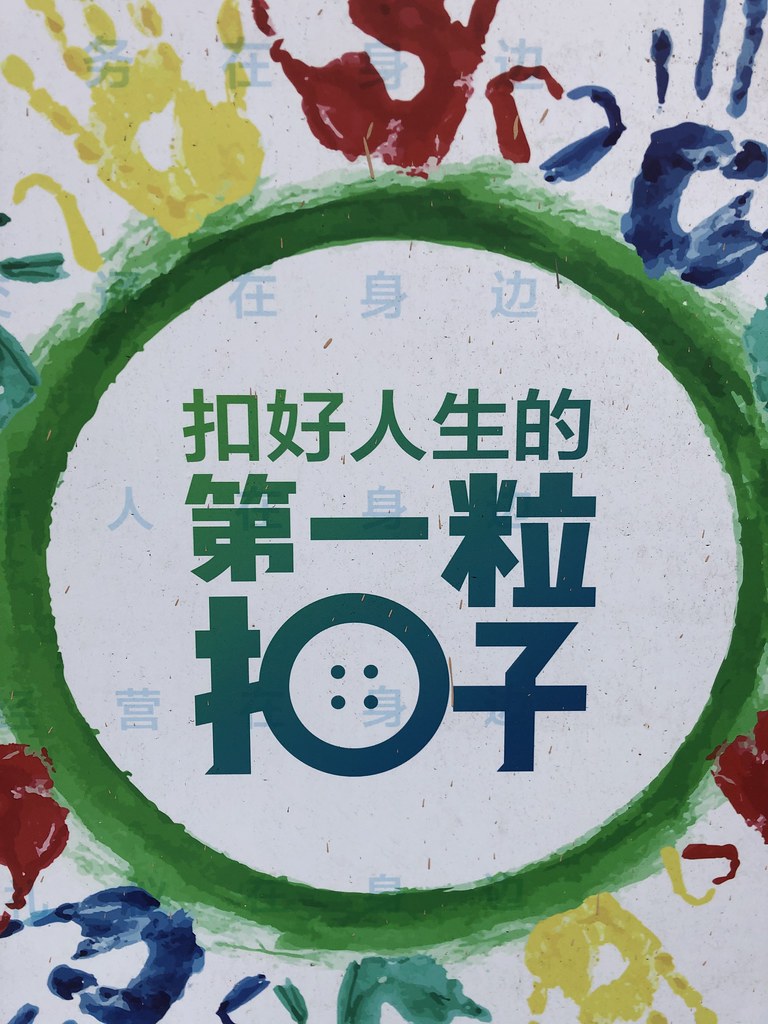
The word is 扣子, meaning “button” (the kind you sew onto clothing). In Chinese, the kind of button you press is a totally different word, and even has the verb for “to press” as the first character: 按钮. (When you think about it, it seems kind of dumb that we use “button” for both of those things in English. Sure, you can say “push-button” in English, but it still feels to me like whoever decided to use the word “button” for the new kind that you press wasn’t super bright…)
Here’s the larger context:
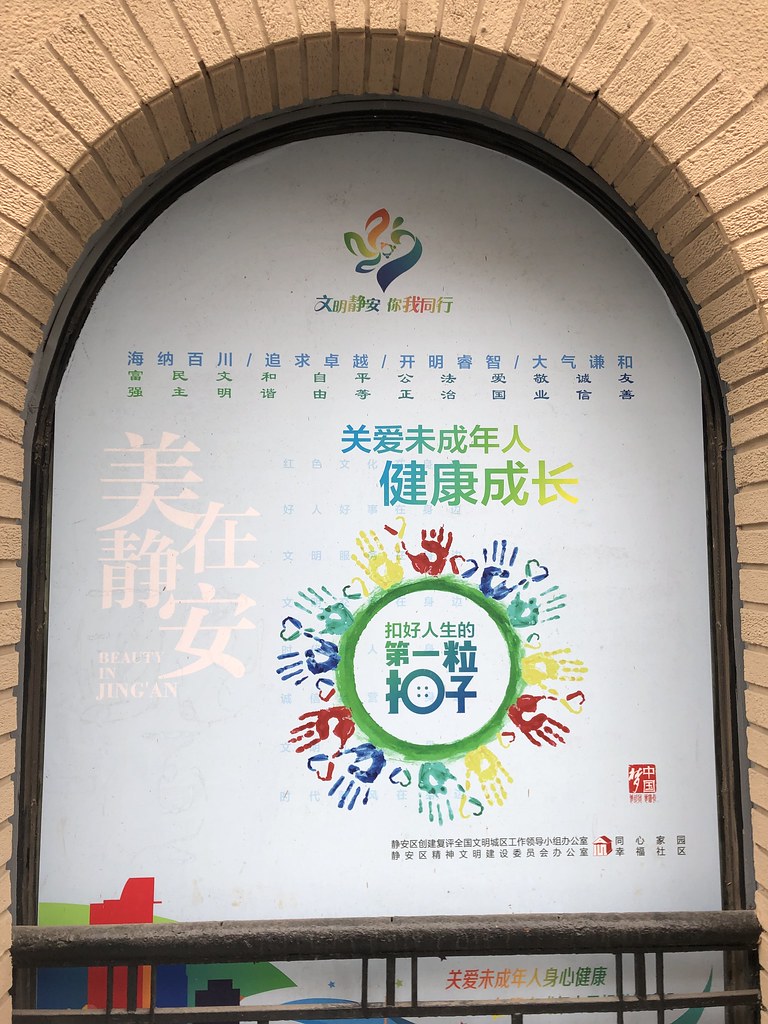
20
Feb 2019Cthulhu in China
It’s always fun to discover cultural tidbits from home unexpectedly implanted in China, whether it’s Marvel superheroes, Steve Jobs, or even potatoes. So it was fun to make these two book discoveries in my local bookstore:
Snow Crash
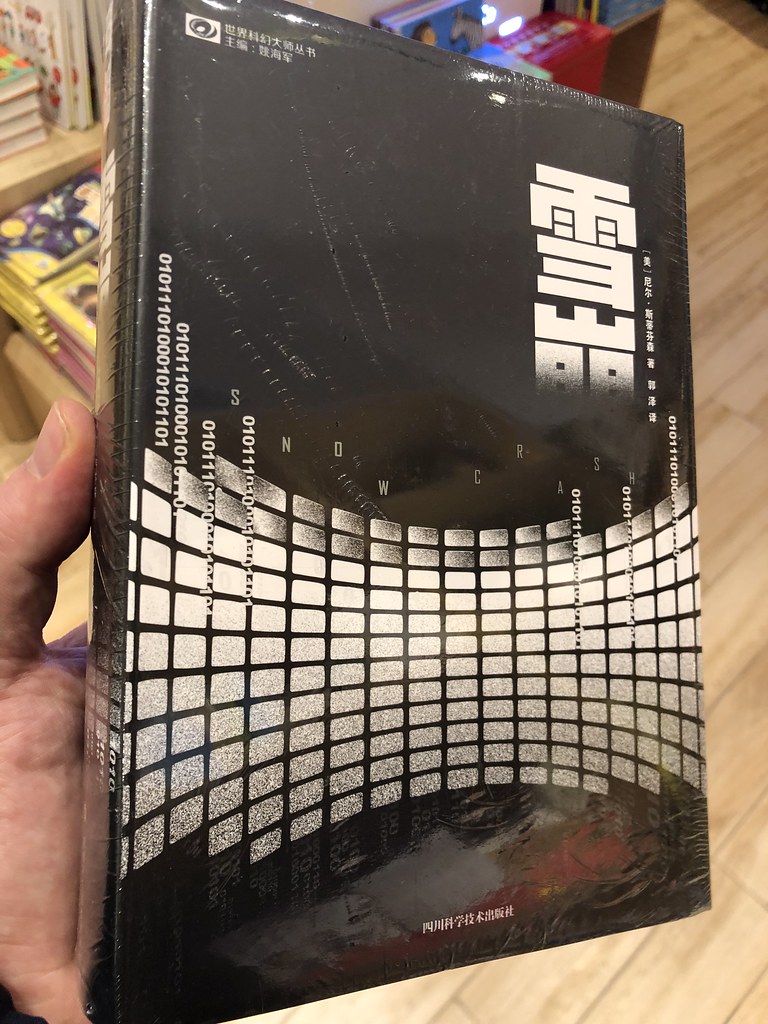
Snow Crash (雪崩) is a classic cyberpunk novel by Neal Stephenson (尼尔·斯提芬森). 雪崩 simply means “avalanche,” so it’s a shame that this translation seems hardly nuanced. But still… it’s Snow Crash!
Cthulhu
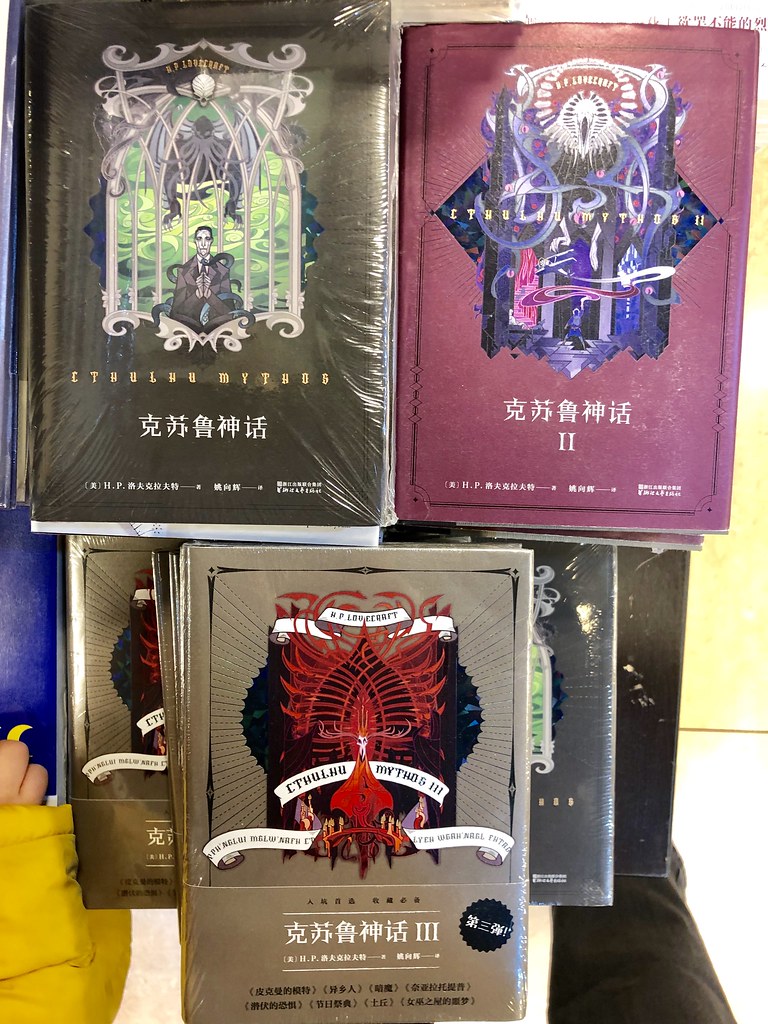
H. P. Lovecraft‘s Cthulhu Mythos (克苏鲁神话) is well-known by all American geeks, but this is the first time I’ve come across it in China. Three volumes, even! The books were shrink-wrapped, so I couldn’t see exactly what they contained without buying them.
Xi Jinping’s Stories
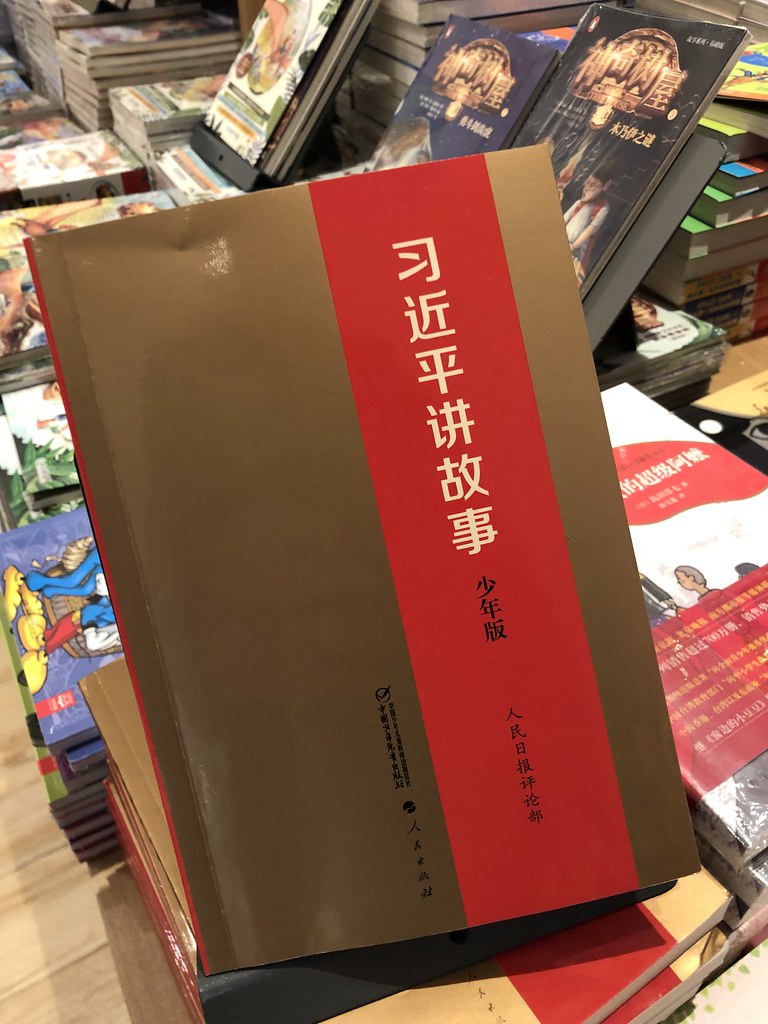
Finally, there’s this gem: 习近平讲故事 (Xi Jinping Tells Stories). The book was with children’s books, but a quick glance revealed that this was not a book for kids. Yes, it was stories, but it was the sort of pretty straightforward propaganda the cover suggests, intended for adults.

